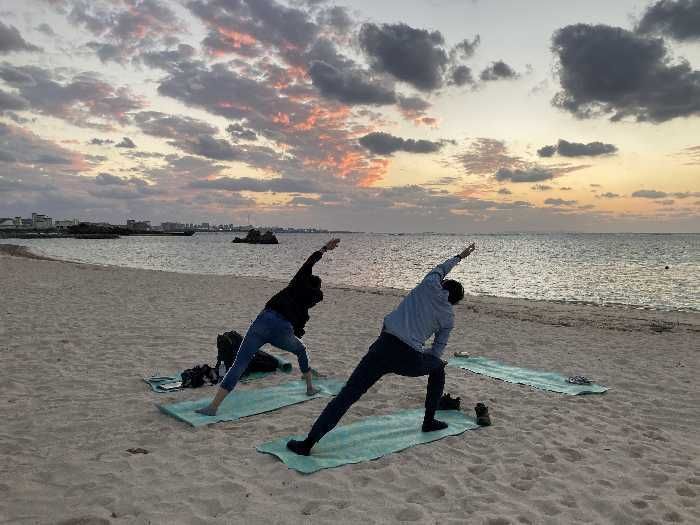In workation study, OPG finds that sleep and concentration improve when working in Okinawa

Participants of the demonstration experiment for the “Okinawa Workation Promotion Project” doing yoga on the beach in Okinawa in November 2021
March 18, 2022 Ryukyu Shimpo
By Wu Li Jun
Recently, the Department of Culture, Tourism and Sports of the Okinawa Prefectural Government carried out an experiment on the mental and physical health effects of “workations” where employees telecommute while enjoying time away from the office. The experiment was conducted in Tokyo and Okinawa, with the same people as the subjects. Results showed that working in Okinawa, especially, yielded improvements in sleep quality, degree of concentration, and inspiration, and also led to a reduction in stress. As for different occupational categories, these effects came readily to a person working in marketing.
The experiment covered five men and women, aged 30-40, whose occupations are marketing, clerical work, research, engineering, and business. These five people were separated into two teams, and stayed for three nights and four days from November 8-11, 2021, in Yaeyama (Ishigaki Island/Taketomi Island) and Naha/the central region. The participants experienced the special qualities of their respective regions, and have verified the effects of these experiences.
According to an evaluation of the participants’ sleep determined by their pulse, the total time spent asleep in Tokyo was longer, but the proportion of deep sleep in Okinawa was 21 percent higher. In Okinawa, as compared to in Tokyo, the participants’ drowsiness in the morning was an average of 21 percent lower, and their fatigue was an average of 20 percent lower in the morning and an average of 11 percent lower in the afternoon. The participants’ motivation to work was measured by their brain waves, and in Okinawa, compared to in Tokyo, their motivation was improved by 27 percent in the morning and by 13 percent in the afternoon.
In degree of concentration tests, the participants’ degree of concentration was four percent higher in the morning in Okinawa. Even when the degree of concentration was measured through typing in English, their degree of concentration was shown to improve by five percent in Okinawa. The trend in which the participants’ degree of concentration was improved could be seen from three days’ stay in Okinawa.
Participants’ stress levels were measured by their brain waves during their leisure time in the mornings, and the Naha/central region team’s stress levels were 16 percent lower than their stress levels had been in Tokyo.
(English translation by T&CT and Erin Jones)
Previous Article:2.7-meter-long giant oarfish found on Kunigami coastline despite being a deep-water fish
Next Article:“Don’t make Okinawa a battlefield again” The No More Okinawan War, Life is a Treasure committee warns of the danger of militarization in their inaugural conference
[Similar Articles]
- Okinawa at its warmest in postwar period
- Kyoto University professors detect PFOS concentration of 4 times national average in Ginowan residents’ blood
- Okinawa’s tourism revenue for 2018 at record high of 733.4-billion yen
- Okinawa has highest poverty rate in Japan
- 2016 demographics: Okinawa birthrate remains highest in Japan for 43 years straight, but natural growth rate lowest since reversion
 Webcam(Kokusai Street)
Webcam(Kokusai Street)


